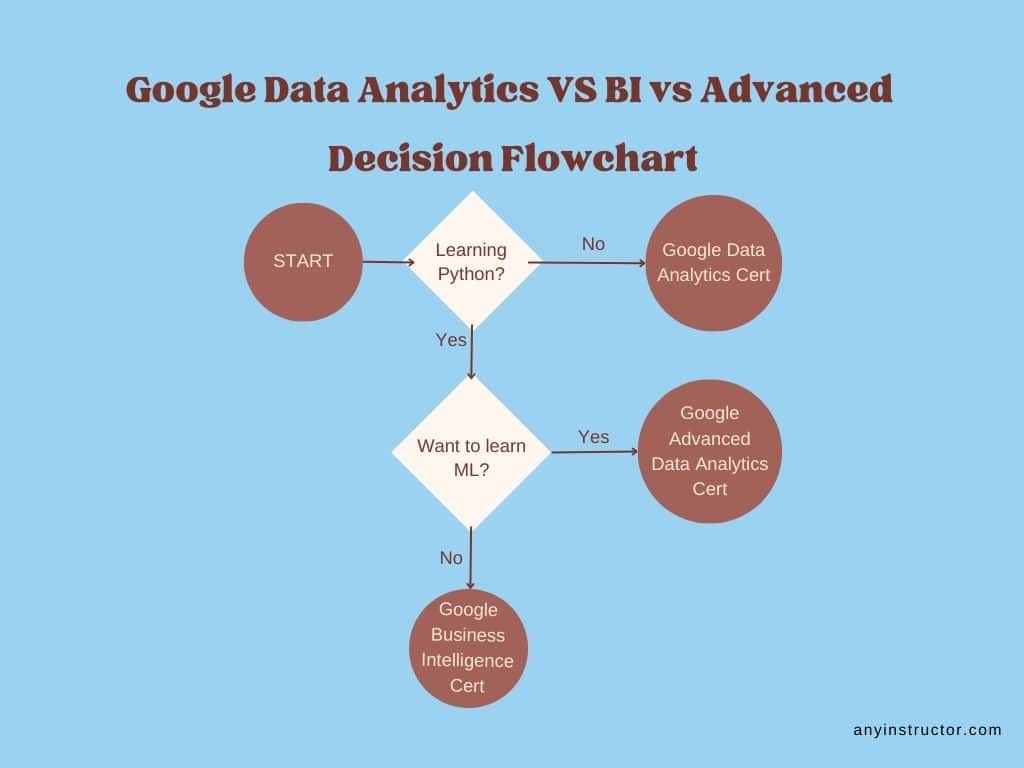This post may contain paid links to my personal recommendations that help to support the site!
Are you planning to get into data analytics? If so, you may find yourself faced with an important decision: choosing the right certificate program from Google. I mean, there are so many of them to choose from!
Well, fret not! In this blog post, we will explore the differences between the three main Google data certificates: Data Analytics, Business Intelligence, and Advanced Data Analytics. I’ll also help you determine which is the best fit for your career aspirations.
Whether you’re a data enthusiast, a business professional, or someone looking to level up their analytical skills, this comparison will give you all the needed information about these three programs.
First up, let’s have a quick comparison!
Comparison Summary: Google Data Analytics vs BI vs Advanced Data Analytics
Have a look at this table below for a simple flowchart to help you understand which certificate is right for you!

Let’s have a look at some areas where they are similar and where they differ:
1. Target Learners
The Google Data Analytics certificate mostly targets beginners who have little to no experience in the field. It’s a great starting point for those looking to build a foundation in data analytics.
The Business Intelligence certificate, on the other hand, is more suited for professionals with some knowledge of data analysis and visualization but who want to further their knowledge in data visualization.
Finally, the Advanced Data Analytics certificate is designed for intermediate learners individuals who are already working within the field and want to advance their skills in machine learning.
However, in my personal opinion, all three certificates are simple enough for beginners to get started since they do not have prerequisites for learning.
I’ve personally taken the normal Google Data Analytics certification while I was a data analyst intern and have found it to be very helpful. I’ve also explored the other two certifications and they seem to be rather beginner-friendly.
In general, all of these certificates are viable for early-career data analysts and enthusiasts.
2. Program Content and Topics
The Google Data Analytics certificate focuses on the fundamentals of data analysis, including extracting and manipulating data.
They provide lectures on the following tools:
- SQL
- R
- Google Sheets
- Tableau
The Business Intelligence certificate goes into more detail in terms of data modeling, dashboarding, and handling business stakeholders. They also teach BI tools.

Some tools include:
- SQL
- Tableau
- Google BigQuery
The Advanced Data Analytics certificate covers more advanced topics such as predictive modeling, data visualization, and machine learning.
They mostly teach various packages within Python.

As you can see, each certificate builds upon the previous one by delving deeper into various aspects of data analytics. So, if you’re new to the field, starting with the Google Data Analytics certificate would provide a solid foundation for the other two certificates.
3. Time Commitment and Cost
For the Google Data Analytics Professional Certificate, it will take 2-3 months, on average, to complete. This will vary depending on having previous data background, learning speeds, and hours committed per day. Although Google suggests a 6 month completion time, most finish the program earlier.
It costs $49/month to complete the entire certificate course content.
The Google Business Intelligence certificate is the shortest, with an estimated completion time of 2 months or less. It has a similar cost structure to the Data Analytics certificate.
Lastly, the Advanced Data Analytics certificate takes approximately 3-4 months to complete at an average time commitment of 10 hours per week. This certificate is also priced similarly to the previous two certificates at $49/month.
Alternatively, I’d recommend going for a Coursera Plus Monthly Subscription of $59/month, which gives you access to ALL 3 courses and many more from their catalog.
4. Skills and Career Opportunities
The Google Data Analytics certificate provides a strong foundation for anyone looking to enter the field of data analytics. It covers all the necessary tools and skills to understand, clean, analyze, and present data.
Some of these skills include:
- Data cleaning and transformation using Googel Sheets
- Basic SQL for querying databases and datasets
- Data visualization
- Data analysis using R
- Dashboard design
- Data analyst resume and interview prep
With the Business Intelligence certificate, you’ll learn in-depth about specialized BI tools such as Tableau and SQL, which are in high demand among businesses today. You will also gain valuable experience in data modeling and dashboarding techniques that are essential for business intelligence roles.
The Advanced Data Analytics certificate takes things even further with a focus on advanced topics like predictive modeling, machine learning, and data visualization using Python libraries like Pandas and Matplotlib. This certificate is most suitable for those looking to pursue careers as data scientists or machine learning engineers.
5. Difficulty Level
Each certificate has its own level of difficulty, with the Google Data Analytics certificate being the most beginner-friendly and the Advanced Data Analytics certificate being the most challenging.
For those new to data analytics, starting with the Google Data Analytics certification would be a great way to build a strong foundation and gain confidence in your skills before moving on to more advanced topics.
It’s important to keep in mind that the difficulty level also depends on your personal interest and prior knowledge in the field.
If you have a strong background in handling data in finance or any other relevant information analysis methods, you may find the Google Data Analytics certification easy and may want to challenge yourself with the Business Intelligence certificate.
I’d also say that the difficulty level of the BI certificate is somewhat easy too, and should be pursued if you’re in a data-driven role like a digital marketer, operations analyst, supply chain analyst, business analyst, or even a front-end developer.
Related Questions
Which certificate is best for beginners?
The Google Data Analytics certificate is best for beginners as it provides a strong foundation in data analysis and visualization without any prerequisites.
Is there any pre-requisite for these certificates?
No, there are no prerequisites for any of these certificates. However, having some prior knowledge or experience in data analysis can be helpful.
Can I take all three certificates at the same time?
Yes, you can enroll in multiple courses at once through Coursera Plus Monthly Subscription. However, it is recommended to focus on one certificate at a time to fully grasp the concepts and skills being taught. So, it’s best to complete one certificate before moving on to the next.
What are the job opportunities after completing these certificates?
After completing any of these certificates, you can pursue various roles such as:
- Data Analyst
- Business Intelligence Analyst
- Data Scientist
- Machine Learning Engineer
- Marketing Analyst
- Operations Analyst
- Supply Chain Analyst
- Financial Analyst
- Business Intelligence Analyst
The exact job opportunities may vary depending on your location, experience, and skills.
However, with the growing demand for data-driven decision-making in businesses, these roles are in high demand and offer competitive salaries.
Which certificate is best for learning Python?
The Advanced Data Analytics certificate would be the best for learning Python as it covers topics such as predictive modeling, data visualization, and machine learning using Python libraries like Pandas and Matplotlib.
The other two certificates do not include any lectures on Python. However, the regular Google Data Analytics certification provides data analysis in the programming language instead.
Are data analytics certificates worth it?
Yes, data analytics certificates are worth it as they provide a structured and comprehensive learning experience that can help you develop in-demand skills in the field of data analysis.
These certifications also add credibility to your resume and demonstrate your commitment to continuous learning and growth.
Additionally, completing these certificates may open up new job opportunities or lead to career advancement within your current organization.
Overall, investing in a data analytics certificate can be beneficial for your career growth and development.
However, it is important to also gain practical experience through internships or projects to supplement your learning from the certificates. Ultimately, it depends on your personal goals and motivations for pursuing these certificates.
Final Thoughts
In conclusion, all three certificates from Google provide valuable knowledge and skills in the field of data analytics. The choice ultimately depends on your background, career aspirations, and time availability.
I hope this comparison has helped you understand the differences between the Google Data Analytics vs BI vs Advanced Data Analytics certificates and guide you toward choosing the right program for your goals!
